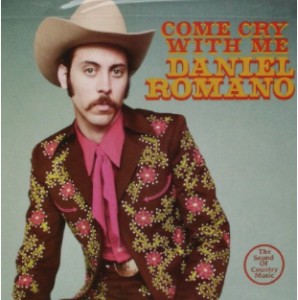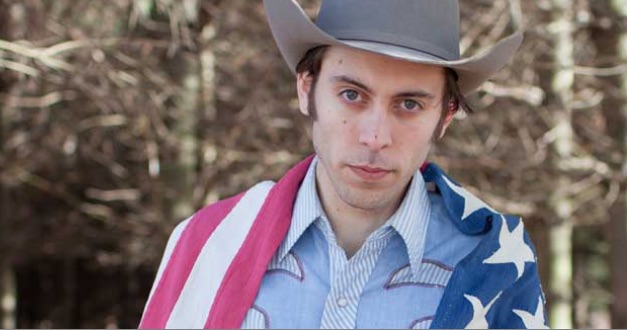Canadian singer-songwriter Daniel Romano has been called the King of Mosey, a term he coined for himself to avoid placing his own classic country crooning into too narrow of a musical box as the public eye sheds more and more disdain on modern Country. He plays at Boone Saloon this Monday night, closing out his most recent nonstop tour.
Timon Griffin, of the local opening act Space Canoe, of the “cosmic American music” genre, his term for funk musicians playing country, has been listening to Romano’s music for a couple of years now.
“For a die-hard country music fan, Romano’s work is certainly a breath of fresh air,” Griffin said. “Real country music seems far and few between these days considering the huge presence of the bubblegum bullshit coming out of Nashville, known as ‘pop-country.’ Listening to Romano, I could immediately admire the honest sound of country music as well as an honest songwriting style.”
Griffin said it seems Romano is striving to continue the legacy of bringing country music back to the youth, reclaiming the genre from the modernized persona.
“In a broad sense, country is not cool,” Griffin said. “I think Romano and myself both share a similar vision of showing people what country music actually means to us and what it’s all about. As we’re not the only one’s trying to make this statement at this point in time I think there’s slowly a shift occurring across the country opening up a space for real country musicians once again.”
Griffin is excited for the opportunity to play with someone he calls “one of the greatest country geniuses of our generation.”
Daniel Romano and Space Canoe play at Boone Saloon this Monday at 9 p.m. Tickets are $7 at the door.
The Appalachian spoke with Romano about his music, the industry and his recent work.
____

The Appalachian: It looks like around 110 people say they’re going to your show in a bar on a Monday night in Boone. Why do you think you resonate with the people here?
Daniel Romano: “That’s a hard question to answer. I think having the answer would be bad for me. I don’t know. I’m not entirely sure. I think avoiding me knowing the answer to that is for the best, but I’m obviously very appreciative and flattered that that is the case.”
TA: Is it weird being Canadian and playing in places like Texas and Tennessee?
DR: “America is a daunting country for me. It’s so big, and there’s so many places to play. You never know. It’s always a roll of the dice, really, about where it’s going to work out or really flop. It’s not weird in an aesthetic way, because in my opinion I’m doing it better than most of the people there. No one really cares, which is kind of cool. There’s just as much country in Canada from the heydays are there was down here, and there’s just as much entertainment and country and western television shows, record labels, and all of that stuff. I have a hilarious collection of really bad ‘B country’ Canadian artists.”
TA: Tell me a little about your King of Mosey title. Where did it come from, and why do you go by that?
DR: “It’s as simple as this, really. I don’t personally know what Americana means or ‘get’ it really. I don’t really understand it. I hear the bands with whatever the club that is Americana and it’s just like it could be anything. It could be bluegrass, it could be some sub-section of country music, it could be rock and roll. I just don’t get it, and everyone is obsessed with subgenres, panicking to be so precisely labeled for a niche market, and I don’t think that’s a good approach to anything. I wanted something completely different than nobody calls themselves. You can’t call it country music because country is something entirely different now. I don’t want to be trapped. I don’t want to have to do the same thing every time, that would suck for me.”
TA: A lot of people call your work heartbreaking. Can you tell me a little bit about your songwriting process and if these emotional experiences are based in real life?
DR: “There’s no real life aspect or element to any of it, really. I guess I could credit myself with being a good listener or a good watcher of life, but none of it really comes from my own experience, it more comes from my opinion of what that experience might be like. Sort of like a dramatized self-reaction to a scenario that I’ve made up, or something like that. But I haven’t really had to go through anything.”
TA: It kind of sounds in that way like you play a caricature of a country artist, is that fair to say?
DR: “That’s what it is with every country artist. None of those guys in Nashville right now come from anywhere other than Seattle or something. They moved to Nashville, bought boots, bought a hat, bought a truck and went to whatever artists development portion of the record label who told them ‘we think you should wear this and change your name to Dierks Bentley because Frederick doesn’t sound like a good country name.’ It’s all money, it always has been. I resonate because I write good songs, that’s all.”

TA: What have you been working on these days?
DR: “I made one record about a year ago and I sat on it for a really long time because I couldn’t get a copy of it and I was just in my mind thinking that it wasn’t that good, so I wrote a bunch of new songs and made a record of that. I was only going to put that one out, but I came back to the other one and decided it wasn’t that bad. I always progress and it’s kind of daunting to go back, but I feel that it captures whatever I was doing at that time. I’m more proud of the second one because it’s newer, but by the time it comes out I’ll have a wear-off period.”
TA: How does your past life as an indie-rocker play into what you do now?
DR: “I guess it gives me an upper hand. I know how shitty everything is, and in those days I had to learn a lot of trades and the secondary aspects of this industry and the day-to-day stuff, just all the different artistic elements of things because in the beginning we couldn’t pay someone to do the artwork or that kind of stuff. I’ve always been interested in that stuff and I’ve always done it, but honing those crafts was basically driven by necessity and lack of professional aid and designers that I would have loved to have hired and still love to. I’ve had the opportunity to do that but I also kind of really enjoy doing it. [Art] helps to get that creative release out of the way. It feels the same. It’s the same kind of internal reward to get the main line of a song.”
TA: Do you have a lot of time for that these days?
DR: “Sometimes I come more prepared than others. I didn’t really bring much with me this tour, but that’s basically my job when I’m home. Pretty much everything I do is within the confines of music in someway or another.”
TA: What’s next for you, right now?
DR: “Boone is actually the last stop on this run, and then we have three weeks off before we have to go down to Stagecoach Festival in California. Then a day later we have to somehow be in Detroit, and I don’t fly so it’s a total nightmare of a drive to get there for rehearsal and the show, then run to Detroit to play with Hurray for the Riff Raff. It’s going to be a great show, but I’m sure I’m going to be totally dead for the first bit.”
TA: I guess driving across the country kind of plays into the country/cowboy persona.
DR: “I used to work as a guitar player in another band, as a job, and there were so many fly out shows that it seemed like I was flying every day for half a year after doing it for seven years. For the last bit it was so draining and I was noticing bad effects of a speedy lifestyle and I just gave it up. Since then I’m more relaxed. I can take a week off and sit on a boat and just do my work. You get squirrely when you fly for 50 days and you get home and don’t know what the hell to do.”
TA: So does that make Boone as a final day on the tour a chance to go all out?
DR: “Oh yeah I’m going to smash my guitar over my face. No, I don’t know – it should be really good though, the tour has been great so far. It’ll hopefully be good.”
TA: Anything else you want to say?
DR: “I guess thank you is really what I should say, you’ve done the hard work for me. Thank you to the kind college kids in Boone.”
Story: Lovey Cooper, Senior A&E Reporter

Emily Cooper • Apr 2, 2015 at 6:06 pm
That album cover is terrific. 🙂